Claire McCardell Fashion Designs: let’s look closely at the art!
Today we’ll look closely at the constructions of Claire Mccardell fashion designs to deepen our understanding of garment construction and bias cuts made visible through stripes and plaids. (for more understanding of these principles, I invite you to Patternmaking Demystified (plus draping) online intensive.)
She’s also one of the 26 featured biographies in my book The Language of Fashion Design.
For other “museum visits”: see Agatha Ruiz de la Prada page, Seydou Keita post and Tamara de Lempicka post)
Claire McCardell
(1905–1958) was an American fashion designer in the arena of ready-to-wear clothing in the 20th century.
From the 1930s to the 1950s, she was known for designing functional, affordable, and stylish women’s sportswear within the constraints of mass-production,
Today she is acknowledged as the creator of the “American Look“, a democratic and casual approach to fashion that rejected the formality of French couture.
(CREDIT: I took that from Wikipedia’s description).
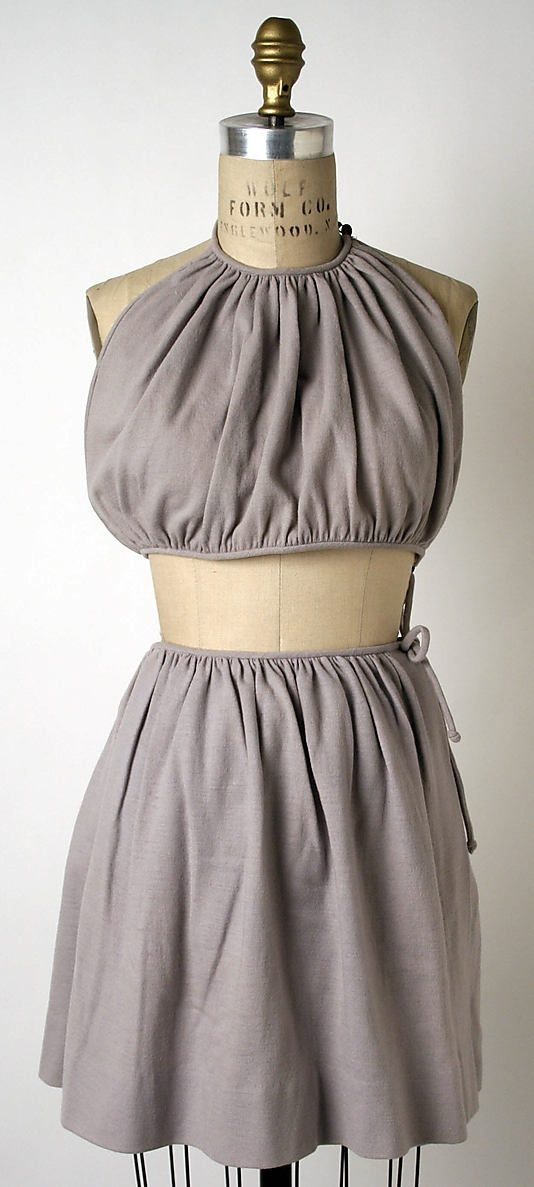
Yes, folks, thanks to the resources available today, I am able to quickly pull together an impromptu “museum visit” for you .
Also, You can get a “live” talk through/ walk-through these images, with me, in this VERY INFORMAL periscope replay video.(my daughter is now all grown up !)
As a starry-eyed Junior Year Parsons School of Design Fashion student in 1993, my draping professor (remember the inimitable Maria Laveris, anyone? MASTER craftswoman!!) took us into the then-basement (under Egypt) costume archive at the Metropolitan Museum of Art to see some of the Claire McCardell fashion design garments you see here, and many others.
We observed her garments off of the mannequin, examining their construction inside and out with white gloves, to carefully observe each finish and construction detail.
OH HOW I WISH WE COULD DO THIS TOGETHER TODAY!
Here, you will only see their “outsides”.
Take time to observe, receive and take in the whole of each design. You will not be sorry.
I’m posting this gallery in honor of my online course’s “stripes and plaids” assignment:
Claire Mccardell fashion designs make use of yarn-dyed plaid and stripes-and the beauty of that is that stripes and plaids will always expose the grain of the fabric in the garment, so we can see it laid out plainly for the eye to see.
SO, we can see exactly where the bias is (and remember that bias fabric is elastic, like a lattice and that straight grain is firm and doesn’t stretch), and better understand the creative ways that she worked with the construction using these woven patterns (you’ll see below).
She also often used sleeves cut in-one with the garments (kimono, dolman).
Many pieces were easier to fit arms and bust, and easier to make than set-in sleeves, and often belted.
Stripes and Plaids can really help you understand how garments are put together because they show the grainline or the direction of the threads in the cloth….
Check out my Pinterest board devoted to this topic here.
At the bottom of this page, I also include solid colored garments with exquisite construction that aren’t striped or plaid. MCCardell’s gathered bodices with piped edges or carefully pleating, for example.
Even some of her knit swimwear is in there…thick, but cute! Her swimsuits broke new ground and many of her clothing designs were daring for their time .
Check out My pinterest board devoted to vintage swimwear, here.
Pore over the images on this page, “take what you like, and leave the rest……” whether obvious or not, the simplicity of her vision and craft can be totally taken for granted:
Claire McCardell fashion designs are timeless, relevant, practical, elegant, and artistic.
She is our proudest representation of American design. Influenced by Madame Gres and Vionnet with the innovation of the bias cut, but totally American in her sporty and practical wartime approach to femininity.
If you read the notes and then analyze the garment with the notes, you will learn so much!
I hope I’m not the only one who gets goose-bumps looking at these!
LET’S GO.
Plaids, Stripes, Dots, and Prints: Claire McCardell fashion design.
This jumpsuit and jacket above are cut entirely on bias, lending a soft shape and unrestricted comfort due to the bias’ elasticity.
She also takes advantage of placing the plaid decoratively. matching the stripes at every seam.
The waist is fitted, but there is soft gathered fullness for the bust.
The matching jacket sleeve is cut all-in- one with the jacket, no armhole seam necessary.
The dress below also uses a kimono sleeve cut so that the polka dots are not cut into or interrupted at all in the dress!
Above: the Pleated polka dotted skirt into a slightly bias bodice, French Darts, and no armhole seam…kimono sleeve.
Sweet how the buttons play along on the polka dot by being the same size as the print, along the centerline button placket!
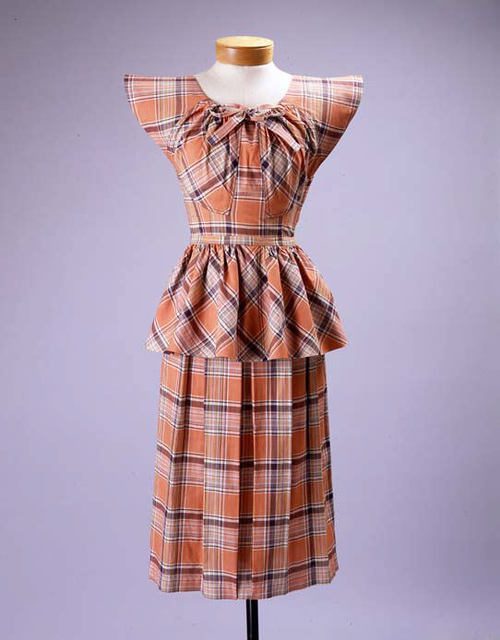
Above is a straight grain bodice, gathered bias peplum for visual interest, pleated straight grain skirt with VERY clever bias panel inserts for bust fullness.
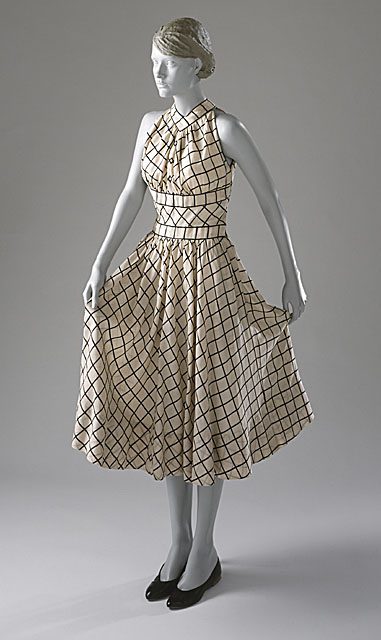
Notice the fluidity of a bias cut plaid skirt.
Usually gathered or pleated skirts are cut on the straight grain, and the visual and the drape are different when rotated to true bias.
A circle skirt is always going to have straight grain in some areas of the skirt, and so the hem will stretch and hang lower in the bias areas.
Always hang a skirt like this for a while before you hem it so it can settle first in gravity. Notice also how wide the hem is inside this skirt.
IT is very challeging to accommodate on such awidely flared skirt! it becomes heavy and bulky, but here is carefully crafted and skillfully constructed.
Strips of straight grain “squares” are placed above and below the bias midriff in this style giving structure and control as well as graphic interest, and an “L” shaped cut of plaid creates the neckline.
Again, gathers above and below the bias bust area give soft fullness.

The paid ensemble above is entirely on bias, gathered into bias waistband, but look at the amazing neckline, using the plaid itself and its straight-grain edges!!!!! This photo is featured in my book.

The playful poufy romper above features spaghetti ties, airy fullness, and straight grain construction using gathers at neck and hem.
Claire McCardell fashion designs speak to a wide range of ages, which is awesome!
Bias cuts, pleats, gathers, and wraps:
Entirely true bias dress OVE with center front seam creating a “chevron” effect, sleeves cut in-one with bodice, shawl collar, and deep, layered inverted box pleating at center front.
Many Claire McCardell fashion designs feature a chevron effect.
This wrap -top features bands/panels of “scrunched” strip, reminiscent of Madame Gres’ sculpted “Greek” gowns.
Notice how they gather into the armhole and release over the bust. Stripes carry movement traveling around the body’s forms.
The wrapping theme comes up again and again in Claire McCardell’s work.

Here she actually uses a set-in sleeve! It’s ALMOST a raglan sleeve, if you look closely you can see how the cap of the sleeve invades the bodice farther than a typical sleeve.
That’s why there is a seam in the shoulder portion of the sleeve to help shape it, which raglan sleeves often need.

Her famous “diaper” suit is like a dress that pulls up between the legs from behind and then ties around the waist for this draped effect. (Does that make sense?) Very cool!
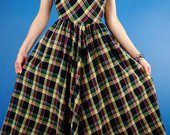
Above, a fitted bias bodice holds incredibly full gathered skirt with bias senter front, straight grain side seams.
She really uses the grain of plaids like a painter :0).
Another bias center front skirt with a straight -grain side seam, bias bodice and waistband. Cinched waist, very full hem!

Her wildly famous “popover” dress was actually sold with an oven mitt during war times when domestic help was unaffordable for most!!!!
ABOVE, a set -in-sleeve…. pleats at center front waist, quilted huge patch pockets with decorative topstitching to match the ovenmit, (she does a lot of huge pockets thank you!).
This is not a stripe or a plaid, but the grainline is still highly visible.

Above, An entirely straight grain shirtdress with a set-in-sleeve, boldly belted (almost corseted) for fit.

There is a lot going on here with all of these pieces! Straight grain plaid skirts, bias chevron skirt at far right, set-in sleeves, matched stripes, straight grain and bias sashes, kimono short sleeves, straight and bias bodice shapes….

To be honest, I have never “met “this dress, so I don’t know if the midriff panel is the same fabric pin-tucked horizontally for decoration (and texture) or if it is another fabric.
Bias panel over bust gathers into the midriff, as does the straight grain skirt below. Spaghetti tie neckline.

Ahh, bias gown, kimono sleeves (no separate sleeves seamed in) and the neckline is cut on the true grain for no stretch and perfect shape.

Some of her colder weather looks, coats and capes.
OBVIOUSLY I’M OBSESSED WITH CLAIRE MCCARDELL’S ROMPERS!


These rompers have the most beautiful ruffled edge and silhouette! All it takes is a sash for a fitted look.

The Chevron effect is created again, when Bias stripes are joined at center from seam, and inverted box pleat at waistline. Sleeve is again integrated in the bodice cut, not separate.

Claire McCardell fashion designs:
practicality, functionality and elegance-from playful daywear to elegant evening wear designs:
Back view of dress, notice that the neckline follows the plaid’s grain and pattern to get its shape, notice the clean closure at back neck, and straight grain pleated skirt.
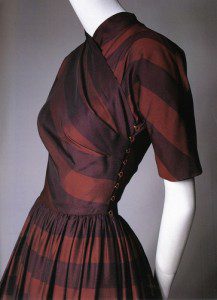
Asymmetrical stripes drape diagonally across the bodice, at side bust to accommodate bust fullness, and there is no armhole, it’s a kimono sleeve cut in one.
Fitted dirndl skirt gathered into natural waist.

Play on grain for pattern interest, the stripes going into the sleeve show that it is the same strip as the upper bodice uses. Fitting panels with vertical seams emphasize the shape of the body not only through the shape but the visual effect of the stripes.

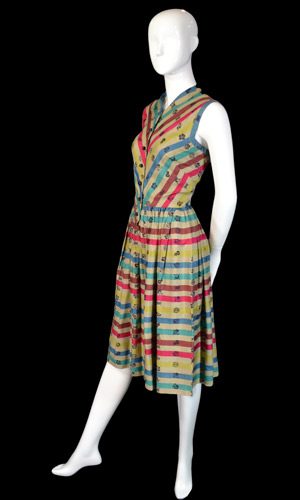
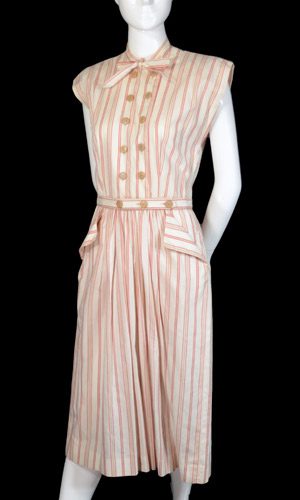


The master at work, Claire McCardell fashion designs. The piece above is boxy, but most of what we see here has a very feminine silhouette.
THE GRAIN IS EVERYTHING!
Watch the stripes, which way do they go on each panel of each garment??
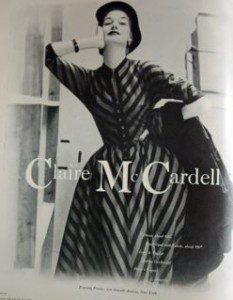

Interesting fabric blocking for playful asymmetry.



This fabric is quite sheer.

Another bias draped boric creates a dartless bodice smooth at right and gathers at the right side seam and sleeve is in one cut again.

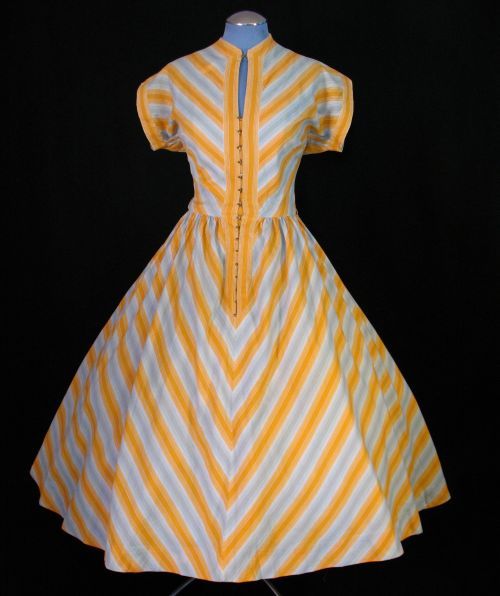

Pleating through bias plaid…… amazing effects!! Too bad the center front skirt button placket doesn’t match up at center front…at a close look, you can see the last button of the bodice is undone, that’s why…..(!)

A totally straight grain garment defined by release tucks through the waist and tucked again into the shoulder.
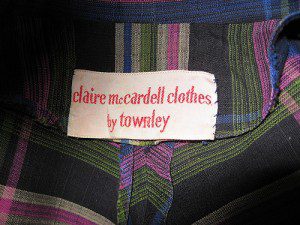
Townley Frocks, the label she designed for.
Many of these Claire McCardell Fashion Designs translate perfectly into today!

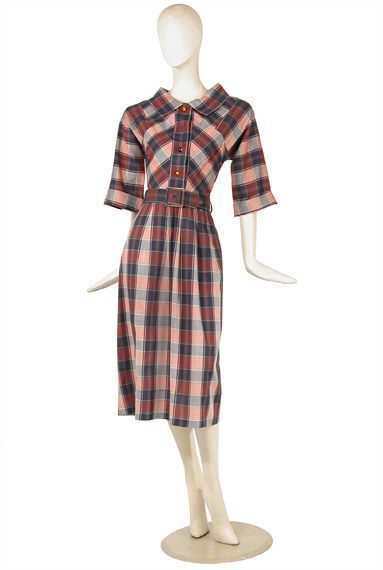

It’s amazing how the plaid is carefully controlled through the hip and releases into the pleated flow above.

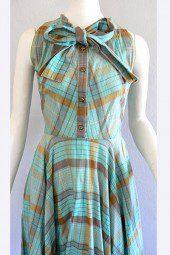
One the left, just see that BIAS BODICE!!!! Notice, at the right. how is the first circle-skirt, full-on circular flare in plaid, in this entire exhibition. You can tell because the plaid “falls” towards the side seams, and because the flares are full at the hem and the waistline is smooth.
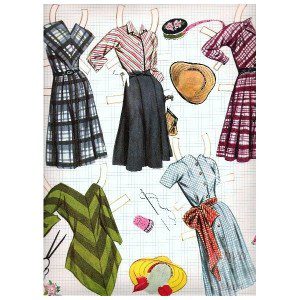
Claire McCardell Fashion Designs inspire paper dolls.

First bias skirt in this group that releases into flares after clinging through the hips, with her huge patch pockets. (You’ll see them if you look closely) Also there is a surprising set-in sleeve. The bias in the bodice is not true bias, but slight bias, and the collar has no stand.

Here is circular flare in stripe, and in the side waist you can see careful rows of tucks lined up into a rigid construction.

Notice how at back, the bodice stripes on the left are perpendicular to the stripes at the right.
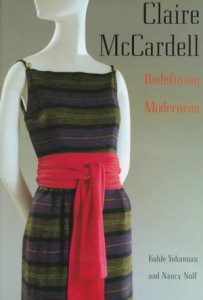
Simple, standard, straight grain shift, above,
and …
NOT, below!!!

Notice how stripes react when gathered..…in the example above.
Claire McCArdell fashion designs often feature bias wrap bodices which fit softly, and feature bold exposure by using the bias over the bust and cutout reveal in between.

If you look above,
you’ll see a circular skirt that is gathered, not smooth, when gathered into the waist.
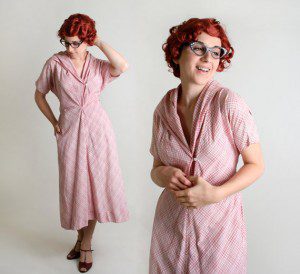
Above, a McCardell dress on a more contemporary model. Similar to the green Chevron effect shawl collar dress up seen above.
I love that the dresses below are designed precisely around the maxi striped fabrics, practically color-blocking the dresses.

NOW FOR SOME SOLIDS:
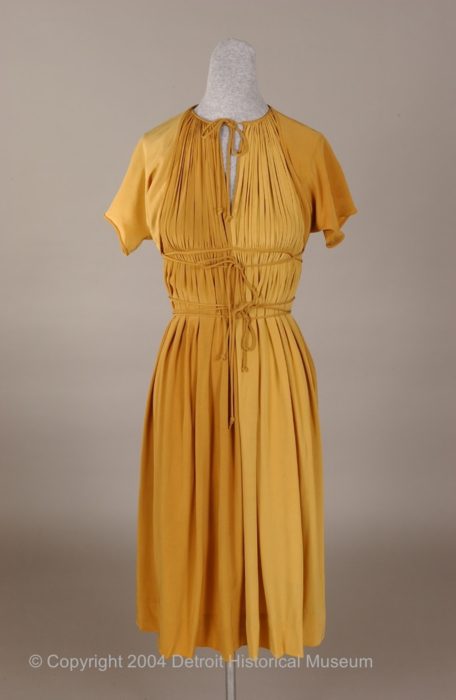
Gathers in this bodice are secured by (bias cut) spaghetti tubing above,
while below, a smoothly fitted bustier pantsuit piece where all of the seams are hidden and emphasized by flat ribbon trim.
The two designs are very different, but echo similar design DNA.
.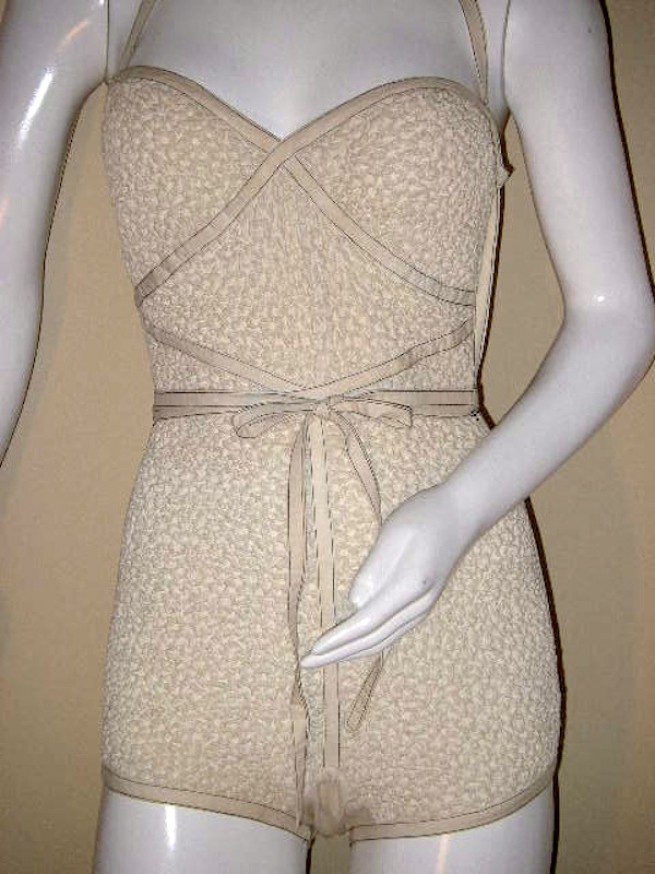
Notice how notions and trims such as sashes and ties emphasize the figure and emphasize clean lines while giving such a finished look.

This is one of the pieces I saw at the Metropolitan Museum of art as a fashion student in my twenties. I sketched it…. I’ll have to post that sketch here when I find it again!
Let’s focus on the fabrics for a minute:

The stripe above shows the French dart in the bias fabric- it’s easier to see because of the stripe.

HOW practical is this shirtdress, above???
The firm brown woven below feels like leather, doesn’t it? IMPECCABLE design!
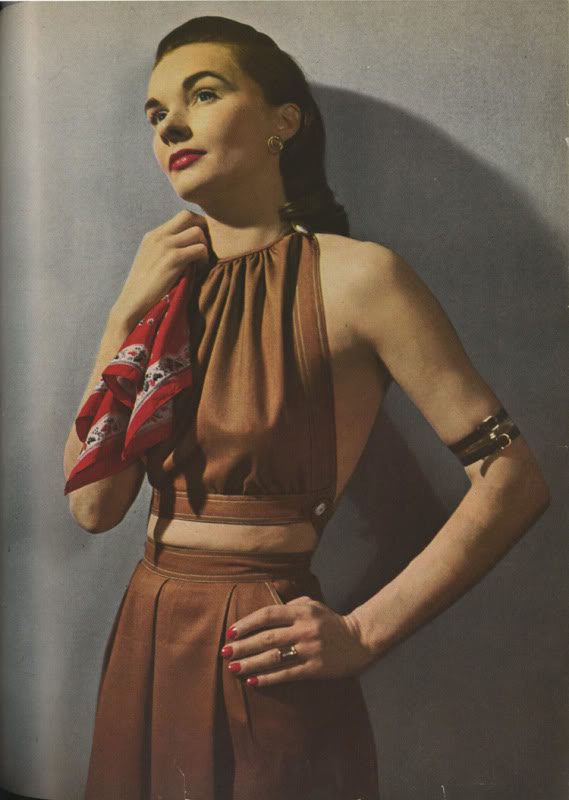
DOESN’T this photo look like a painting by Tamara de Lempicka???

Notice the sleekly, softly draped jersey knit above, This is similar to a style that we saw just a few slides up the page, except that version was woven, if I[‘m not mistaken.
What a contrast to the crisp volume and bulk of the woven fabric, cut on the BIAS AGAIN, below!
Gorgeously constructed with pin-tuck-pleasts ate the side waist. THIS IS QUALITY DESIGN. I’m drooling, I swear.

Below, a perfectly smooth yoke on the midriff is balanced perfectly by volumes of fabric anchored in with gathers above and below.
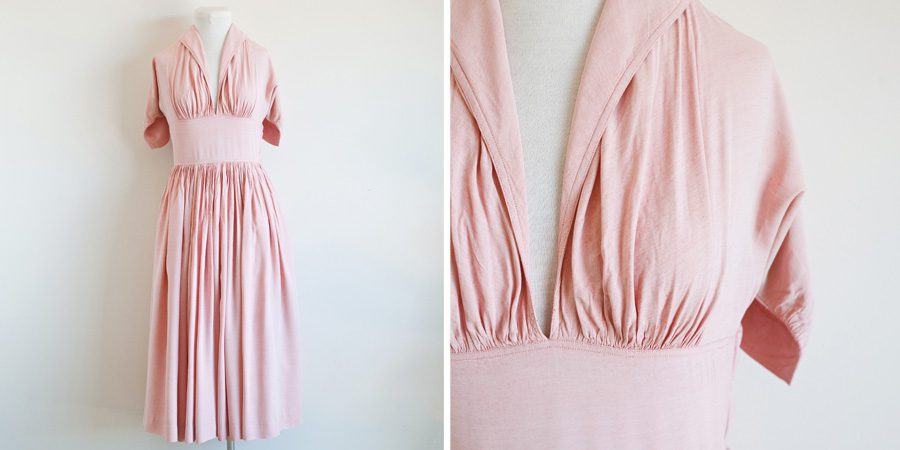
Seriously, one of my favorite aspects of her Claire McCardell fashion designs her the avoidance of the set-in sleeve. Who needs it, really :0)? Kimono sleeves are easy to build, sew, draft, and fit… and are so elegant throughout her works.
Just imagine, how the dress below would work just as well today as it did then!

The sleeves look rigid below, but it will drape softly around an arm when being worn as the arm pulls the sleeve down with it.


Hey, it’s the first Tankini! By Claire McCardell fashion designs- a knitted jersey swimsuit in stripe two piece look.
Below, notice the evenly spaced, crisp box-pleats in the waistline .
(seriously, get Helen Joseph Armstrong’s Patternmaking book to build this vocabulary and understanding if you love this kind of talk.)
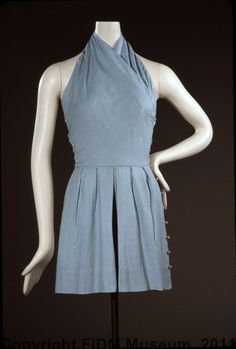
Above, did you notice how the halter top is cut on the bias and draped into the neckline? That’s how it drapes so nicely over the bust without darts. Also, see if you can notice how the bottom half of the garment is totally STRAIGHT grained in contrast. Perfect for holding crisp pleats.
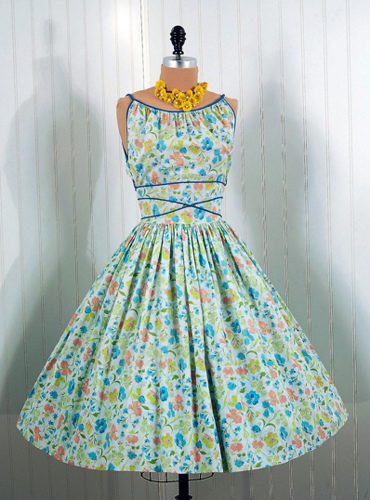
And to finish–A floral print! Do you see recognizable design elements in this dress from other designs we’ve seen above today?
I love how a single designer develops their own language and …. writes poetry with it in a recognizable way. THIS IS FASHION DESIGN at its best.

It’s so bold to see this dress color blocked. See how this dress includes details related to the floral dress before? Also, Claire McCardell didn’t color block that often. In this example, the colorblocking creates asymmetry.
(Asymmetry is a chapter in my book The Language of Fashion Design: 26 Principles Every Fashion Designer Should Know)
To learn to design, model drawing,, technical design, and sketching and illustration, , using the skills and techniques I teach at Parsons, for your own unique fashion designs:




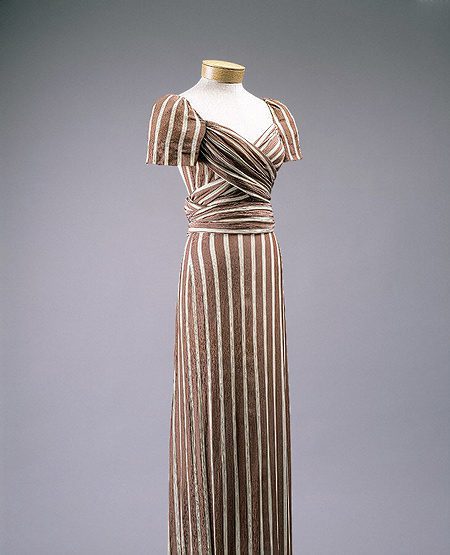

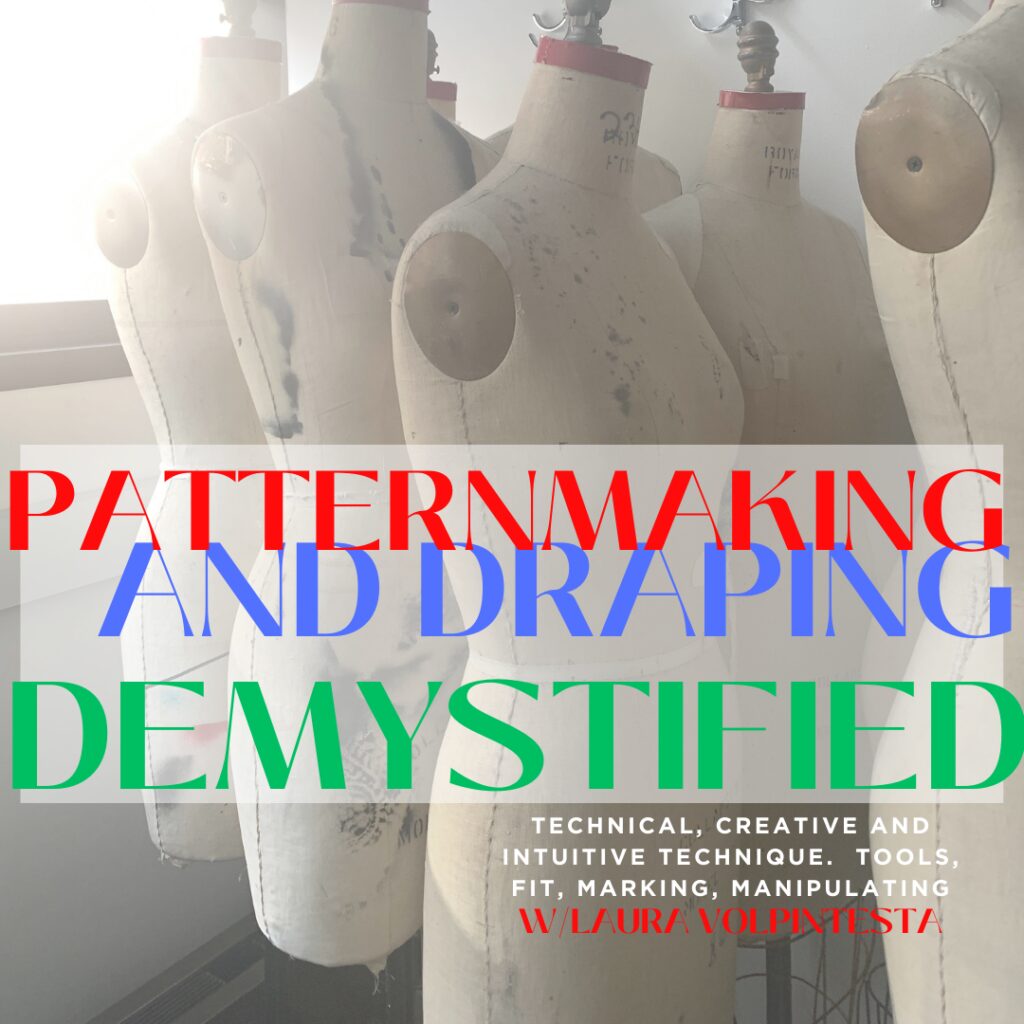
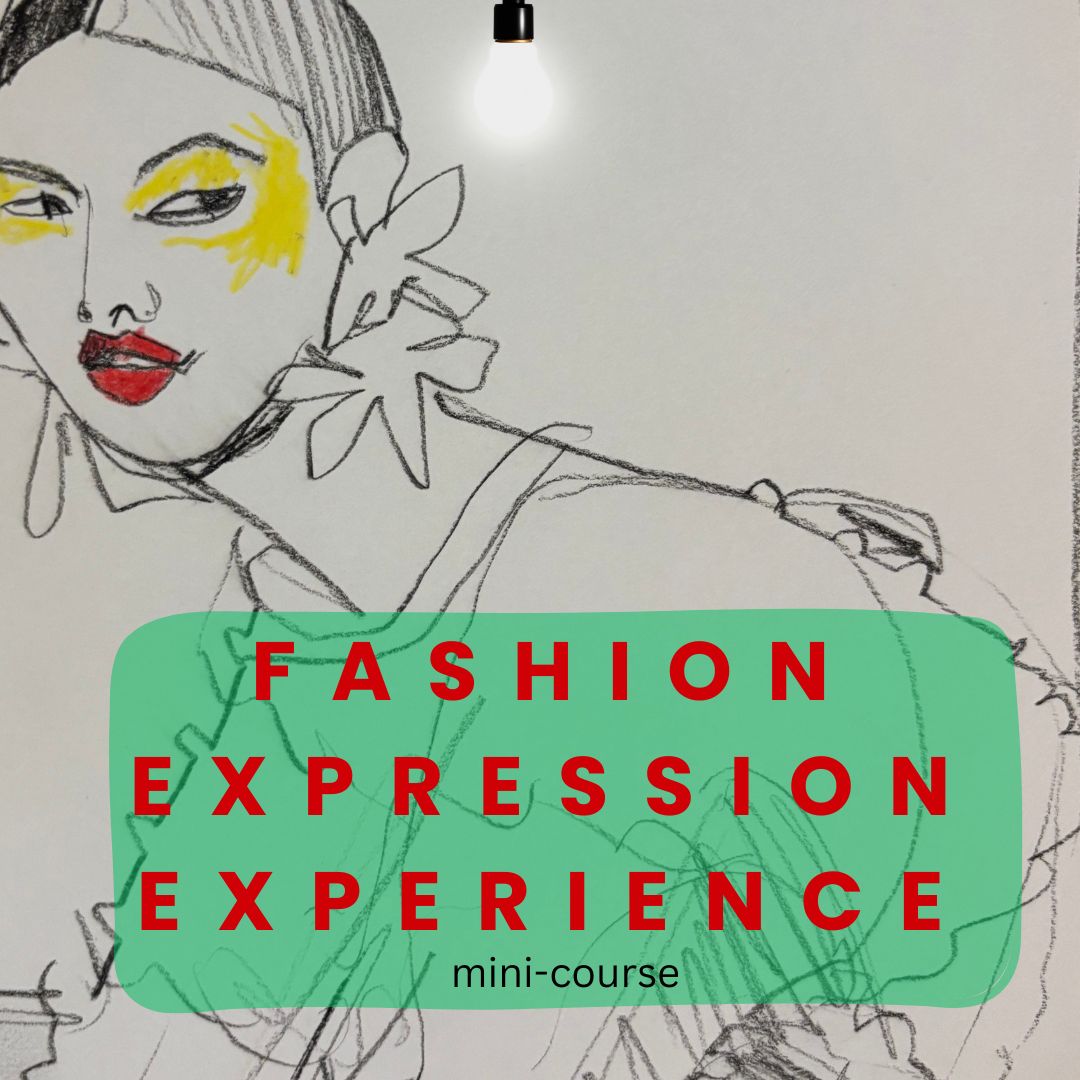
WOW – just, WOW! I recently started reading the CMC bio by Elizabeth Evitts Dickinson (online), and getting such a deep dive into her designs here taught me so much about this legendary designer. What a thrill it must have been to be taken into those archives! & Nothing like seeing the work itself up close to fully appreciate it. She was incredible, and so visionary. I love her use of bias cut everything – so smart and so effective for a great fit.
Are all of these images in your own archives or other books (it appeared some were)? I’d love to be able to look at them again. PS Your explanations, especially of her clever and creative use of plaids and stripes to create new patterns, is fantastic. I also appreciate what you said (and have shown) about the advantages of the kimono sleeve – you’ve made a convert!
Thanks to this post and its abundance of images, I can now really see and understand the CMC approach to design as a way to showcase actual women’s bodies, and how modern an contemporary a lot of her looks are. (That Kaiser Franzen ad, with the totally natural bustline, could be worn TODAY. So forward thinking! Would love to know what year that was – early post WWII?)
Thank you so much for this!